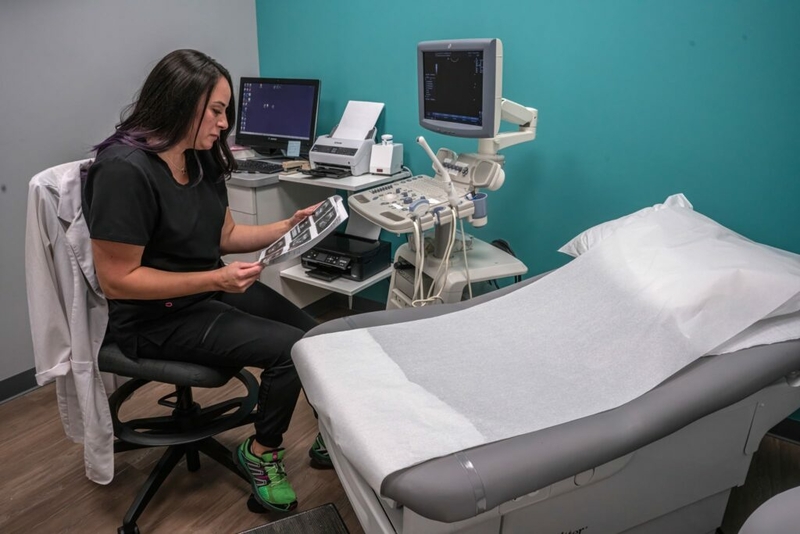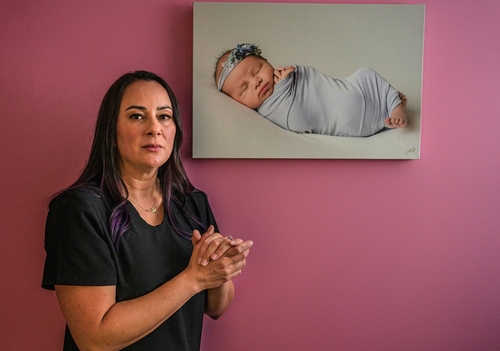‘Waiting for the test case’: lawyers say prosecutions inevitable under Tennessee abortion ban

Dr. Tracy Coffey routinely provides emergency care to pregnant women. Last week, on a Saturday, she performed surgery on a patient to remove an ectopic pregnancy — a procedure doctors at her Clarksville hospital perform about once a month.
But among the many questions about Tennessee’s new abortion ban for which Coffey can find no answers is this one: must she notify the state?
She didn’t report ectopic pregnancy care before the Aug. 25 law took effect. But Tennessee’s ban defines pregnancy as beginning the moment an egg is fertilized by sperm; it defines abortion as terminating a pregnancy. An ectopic pregnancy, by definition, consists of a fertilized egg.
“Are we supposed to fill out state forms for induced termination of pregnancy? No one knows what to do,” said Coffey, an OB-GYN. “I don’t want to get hung up with a technicality because I didn’t file out paperwork.”
Tennessee’s abortion ban, formally known as the Human Life Protection Act, adds just 800 words to the state’s “offenses against the family” section of the criminal code, but the language does not exist in isolation. It fits in with a body of existing criminal and healthcare laws and regulations, including one requiring all abortions to be reported to the state’s Office of Vital Records within 10 days.
Are we supposed to fill out state forms for induced termination of pregnancy? No one knows what to do.
The reporting requirement raises other significant concerns, said Chloe Akers, a Knoxville criminal defense attorney.
The one-page form, titled “Report of Induced Termination of Pregnancy,” asks 20 questions about each abortion, including the date it was performed, the facility, gestational age and demographic information about the pregnant woman. It also asks for the attending physician’s name.
“When I look at this form as a criminal defense attorney, I see evidence of a crime,” said Akers.
“If you terminate a pregnancy you are engaging in criminal conduct, full stop,” she said. “All you have to prove to sustain a conviction is a termination occurred and it was done in Tennessee. This form more or less proves that. And state law mandates your disclosure of engaging in criminal conduct.”
Tennessee law generally safeguards the confidentiality of medical records from public access, Akers said. But the same law allows medical records to be subject to a subpoena. The state law governing subpoenas requires only a statement from investigators that a crime is believed to have been committed to be granted.
“I imagine a literal filing cabinet somewhere in Nashville in the office of vital statistics,” Akers said. “Law enforcement has everything they need at their fingertips to take it to prosecutors.”
A spokesman for the Department of Health, asked to explain requirements for abortion reporting, responded with a link to the law but ignored questions about ectopic pregnancy reporting requirements – and who might have access to abortion reporting forms.
Legal nonprofits launch
Akers is among a small number of attorneys who have been scouring Tennessee’s statutes to gain a full understanding of how the state’s abortion ban will be enforced. In July, she launched Standing Together Tennessee, a nonprofit legal resource center for healthcare providers and attorneys.
This week in Nashville, a group of lawyers launched a separate nonprofit, Tennessee Freedom Circle, to prepare attorneys, and the broader public, to defend reproductive rights.
On Tuesday, during its first training session, attorney Tyler Yarbro parsed the legal language contained in the law, which criminalizes all abortions but gives doctors the right to defend themselves against prosecution if an abortion was done to spare a woman’s life or grave danger to her health. Persons found to have violated the law commit a Class C felony.
The state’s criminal statute definition of “person” includes partnerships, corporations, associations and other entities, Yarbro noted.
“So it stands to reason this very law could be used to criminalize the actions of a corporate entity, not just physicians, but the entities that employ them,” said Yarbro, an attorney with Dodson Parker Behm & Capparella.
The law’s definition of “pregnancy” – from the moment of fertilization until birth – veers from standard medical practice, which marks the beginning of pregnancy at when the fertilized egg is planted in the uterus, which does not occur until 6-12 days after fertilization. That law’s definition clearly encompasses ectopic pregnancy, Yarbro said.
And the language outlining the circumstances that would give rise to a physician’s affirmative defense for providing an abortion – when there is a risk to the life or substantial impairment of a major bodily function for the pregnant person — is vaguely crafted, making its applicability unclear.
“What constitutes a substantial impairment of a major bodily function?” Yarbro asked. “What about an impairment that is partially reversible?”
Conspiracy and solicitation
Yarbro has also been researching the legal risks to medical providers and others who offer assistance to women seeking abortions out of state.
Tennessee’s jurisdictional statute, outlining state authority to prosecute crimes connected to other states, is “much broader than other states,” Yarbro said – likely a function of its unique geography. Other than Missouri, Tennessee borders more states (eight) than any other, and 42 of Tennessee’s 95 counties share a common border with another state.
The statute gives state courts jurisdiction over people who either consummate a crime in Tennessee that was commenced in another state, or commence a crime in Tennessee that was consummated elsewhere, raising questions about culpability for those providing care to a woman before she leaves the state for an abortion – or post abortion care when she returns home to Tennessee.
The state’s solicitation and conspiracy laws pose risks too. If a physician makes a referral to an abortion provider out of state, does that constitute conspiracy? Could individuals who make appointments for women at out-of-state clinics, or who send medical records to those clinics, be charged under the state’s solicitation laws?
“You’ll see plenty of places telling people to go to abortionfinder.com,” Yarbro said. “That, for the moment, appears to be protected speech. Where you get into solicitation and actual communication with other providers out of state, that’s the area of the law that gives me pause and gives me concern about aggressive and overzealous prosecution.”
‘Affirmative defenses’
For doctors who continue to provide abortions to spare the life and health of the pregnant patient, the “affirmative defense” outlined in the law makes criminal trials inevitable, according to Akers.
“Unless they’re going to get the doctor to waive their Miranda rights and talk them through the whole process before trial, which I would submit is unlikely, they’re almost forced to charge every time a pregnancy is terminated,” Akers said. “This affirmative defense is so unique insofar as you can’t evaluate it from an objective standpoint. It’s entirely subjective, kind of similar to the insanity defense.”
In contrast, a claim of self-defense may be evaluated before a prosecutor ever files charges. Tennessee law governing self-defense asks prosecutors to make an objective assessment of what a reasonable person would do in a given situation. The abortion law requires no reasonable person assessment; it relies entirely on what was in the mind of the provider at the time of the abortion, Akers said.

Akers said she has heard many people suggest district attorneys are unlikely to prosecute doctors under this law. She doesn’t believe that.
Prosecutors have an obligation to prosecute any crime they have probable cause to believe was committed. A 2021 law gives the Tennessee Attorney General the authority to temporarily replace any DA who chooses not to enforce the law.
“When you play this out to its logical end and you understand the duties and responsibilities of each of the different players in this scenario – the doctors, the district attorneys, the law enforcement officers,, and the lawyers – you see a world in which I don’t know how this criminal activity isn’t prosecuted.
Dr. Coffey, the Clarksville OB-GYN, said she would continue to provide necessary abortions to spare the life and health of her pregnant patients, a choice not all of her colleagues are making.
“Everybody across the state is kind of waiting for the test case,” Coffey said. “Each and every one hopes that it is not going to be them.”








